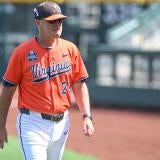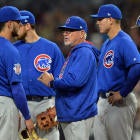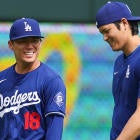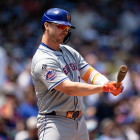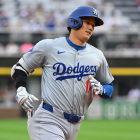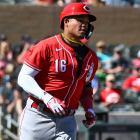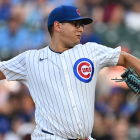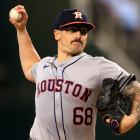The Cubs were able to pull off a nice comeback victory at home Friday afternoon over the rival Cardinals, 3-2. It snapped a six-game losing streak.
Still, the Cubs are just 26-27 on the season, one in which many expected them to win around 100 games and repeat as World Series champion. At the very least, the overwhelming majority believed the Cubs would repeat as NL Central champs. And I'm pretty sure about no one -- not even the most ardent of Cubs' naysayers -- would have said they'd enter June under .500.
What gives?
Here are some of the possible explanations with a breakdown as to the viability (or non-viability) of said explanation as to the sub-par first two months for the defending champs.
They were a fluke
Laughable.
The 2015 Cubs won 97 games, shutout the Pirates in the wild card round and then beat the 100-win Cardinals, three games to one, in the NLDS. That team hit its stride on July 29, we just didn't know it at the time. From that day forward, the Cubs had the best record in baseball at 45-18 (a 162-game pace of 116 wins).
Sure, the Cubs lost the NLCS to the Mets in a sweep, but that doesn't obscure that the team was very legit -- and young on the position-player side -- heading into 2016.
I can't believe it but I've actually been hearing from people that last year's Cubs team was a fluke. If you hear someone say this, charge the mound on account of fighting the ignorance out of this game.
Injuries
Nah.
I mean, they've been slightly banged up, notably with injuries to Addison Russell, Ben Zobrist and Jason Heyward that lingered a bit.
But who doesn't deal with that? The Cubs had a far more meaningful injury in the first week last season and still started 25-6.
A personnel issue
C'mon.
There are always minor differences from season to season, but the major differences are that Dexter Fowler (leadoff man and center fielder), David Ross (backup catcher and clubhouse leader), Aroldis Chapman (closer) and Jason Hammel (fifth starter) are gone.
We can immediately throw Chapman out, because Wade Davis is a perfect 11 for 11 in saves with a 0.93 ERA and 0.72 WHIP.
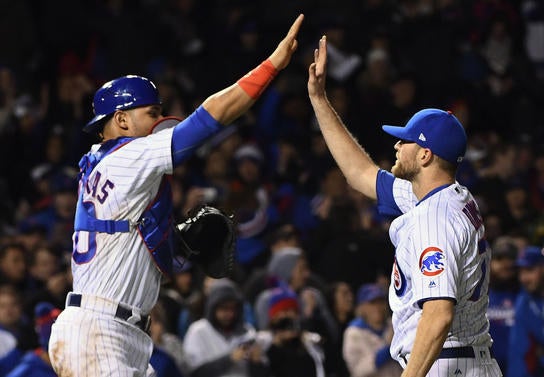
The Cubs are 5-5 this season when a fifth starter (Brett Anderson or Eddie Butler) takes the ball. I can't buy that as being a huge difference when Hammel is pitching to a 6.18 ERA for the Royals.
Fowler is hitting .232/.320/.446 for the Cardinals while Cubs' leadoff men were hitting .210/.315/.407 before Ian Happ went 1 for 4 on Friday. Maybe there's an argument about the psyche of the team missing their "you go, we go" guy -- a player who became extraordinarily popular in his two years with the Cubs. It's possible. We can't know. The line isn't that big a difference though. So I'm not sure you could make the argument that the Cubs should've kept Fowler.
Speaking of not being able to measure the loss in psyche, we can't measure Ross' impact.
I'd be shocked if losing Fowler and Ross' personalities from the locker room all of a sudden made the obvious best team in baseball mediocre. If you honestly want to argue the opposite side, though, I'm not gonna stand in the way.
The only thing I could see here is that having the 2016 version of Fowler atop the lineup would have made a significant difference.
World Series hangover
It's something we can't measure, so many people scoff at the notion, but it's entirely possible this is happening. These aren't robots. The season isn't a computer simulation.
It's been happening lately in baseball.
The 2016 Royals won 14 fewer games and missed the playoffs. The 2015 Giants won four fewer games and missed the playoffs. The 2014 Red Sox won 26 fewer games and finished in last. The 2013 Giants won 18 fewer games and missed the playoffs.
We have to go back to the 2011-12 Cardinals to find a champ in the playoffs the following season.
But what about these Cubs and their offseason? The championship offseason for any player has to be amazing. What if you were part of the Cubs team that broke a 108-year drought and became an instant rockstar in the offseason?
You think that offseason was a little different than the one between the 2015-16 seasons, especially for the younger players?
Again, we have zero chance in hell of quantifying this. I just can't help but think there's some sort of factor here. Just because the Cubs themselves can't reasonably use it as an excuse -- and, man, they really shouldn't even hint about it -- doesn't mean we can dismiss the possibility that maybe they weren't as ready for this season as last, physically and/or mentally.
Regression was coming
If we take the 45-18 record to close the 2015 regular season and then go with the 103-58 from last year, that's a .661 winning percentage, which is a 162-game pace of 107 wins.
That's a great team, but it's also a ridiculous pace in this day and age with very good parity. Even one of the best teams ever would have trouble keeping up a 107-win pace over the course of 2.5 seasons.
According to defensive efficiency, the 2016 Cubs were one of the greatest defensive teams in baseball history. That's not some convoluted, high-brow, sabermetric stat, either. That's the percentage of balls in play converted into outs. That's basic baseball. And they were historically elite at it.
Was that really going to continue?
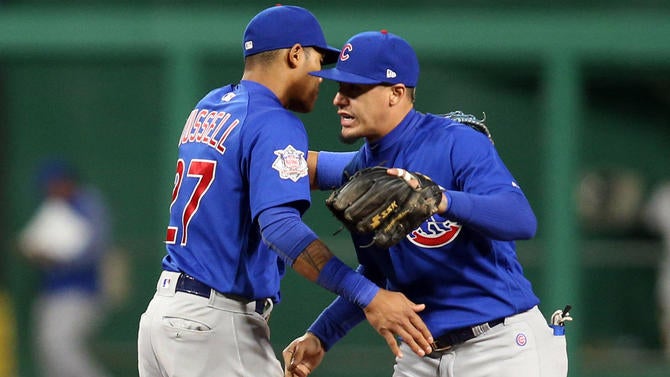
The 2016 Cubs had a 2.96 rotation ERA. The next best in baseball was the Nationals at 3.60. Only five teams were within a run of the Cubs. Only six aside from the Cubs were better than 4.22. That's amazing.
Was that going to continue, especially with John Lackey heading into his age-38 season and Kyle Hendricks coming off an MLB-best 2.13?
This is baseball and extended stretches happen
The 2016 season was magical for the Cubs, but it sure wasn't perfect. The 25-6 start is easy to remember. The Cubs were 50-23 after the All-Star break, too. In between that: 28-29.
Hmmm ... that looks pretty familiar, right? The Cubs are 26-27 right now.
In 2016, there were stretches of six losses in eight games and 15 losses in 20 games. Yet they still won 103 games.
The 2015 Cubs weren't under .500 after April 10, but they were 28-25, 39-35 and then 51-46 after being swept by the hapless Phillies at home in late July. They still won 97 games.
There are also always a bunch of different things conspiring in smaller samples of baseball that just happen. Last year to begin the season, nearly all of those went the Cubs' way. So far this year, they just aren't all too often. That happens.
This isn't to say the 2017 Cubs will be anything resembling the 2016 or even 2015 Cubs. It is to say that this nucleus has been through stretches of baseball that aren't all that different than the one to start this season. It might feel different to fans after a World Series title to realize that the start of 2017 is very similar to a chunk in the middle of 2016 -- because that chunk was buried between an almost unimaginable start and outstanding finish.
As if it weren't obvious as this piece was unfolding, I think it's some combination of the latter three. Lots of good players just aren't playing like they can. Some aren't even close to their level of expected production. Players have down years, but others find a way to get things going and the season evens itself out. The way this all shakes out with this team in terms of the number of players who get things turned around will be what determines whether this was the team's bad, extended stretch -- not all dissimilar to the middle portion of 2016 -- or if this is just the 2017 Cubs.
I firmly don't think this is a personnel issue. The Cubs just need as many as possible from the following group of players to start playing better baseball (some in more extreme cases than others): Willson Contreras, Anthony Rizzo, Addison Russell, Kyle Schwarber, Albert Almora, Jake Arrieta and John Lackey.
They could probably stand to see some modest improvement from Javier Baez, Ian Happ, Kyle Hendricks, Jon Lester, a few relievers, Jason Heyward on offense and the fifth spot in the rotation.
That's a lot of names, man.
The good news is no one is running away with the NL Central and the playoffs are anyone's game. The Cubs could well win 87 games and end up repeat champions. Maybe Friday's win to snap that losing streak was a start here with a 10-game homestand now underway.
Still, they haven't looked close to capable of that so far. They're certainly capable of better, but they need to actually be better in order to accomplish their goal of a repeat. At some point, potential means nothing.
Because they could also very well miss the playoffs, just as the previous four champions have. Remember, the last time any team won a World Series in back-to-back years was the Yankees teams of 1998-2000.




